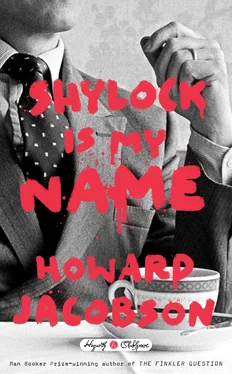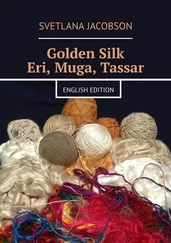—
Long ago is now and somewhere else is here.
How it is that Leah should be buried among the dead of Gatley is a question only a fool would risk Shylock’s displeasure by asking. The specifics of interment — the whens, the wheres — are supremely unimportant to him. She is under the ground, that is enough. Alive, she had been everywhere to him. Dead — he long ago determined — she will be the same. Wheeling with the planet. An eternal presence, never far from him, wherever he treads.
Strulovitch, alert and avid, tensed like a minor instrument into affinity with a greater, watches without being seen to watch. He will stand here all day if he has to. From Shylock’s demeanour — the way he inclines his head, nods, looks away, but never looks at anything, sees sideways like a snake — he is able to deduce that the conversation with Leah is engrossing and devoted, oblivious to external event, and no longer painful — a fond but brisk, even matter-of-fact, two-way affair. Shylock listens as much as he speaks, pondering the things she says, though he must have heard her say them many times before. He has a paperback in one hand, rolled up like a legal document or a gangster’s wad of banknotes, and every now and then he opens it brusquely, as though he intends to rip out a page, and reads to her in a low voice, covering his mouth in the way a person who is too private to make a show of mirth will stifle a laugh. If that is laughter, Strulovitch thinks, it’s laughter that has had a long way to travel — brain laughter. A phrase of Kafka’s (what’s one more unhappy son in this battlefield of them?) returns to him: laughter that has no lungs behind it . Like Kafka’s own, maybe. Mine too? — Strulovitch wonders. Laughter that lies too deep for lungs? As for the jokes, if they are jokes, they are strictly private. Just possibly, unseemly.
He is at home here as I am not, Strulovitch thinks. At home among the gravestones. At home in a marriage.
Strulovitch is pierced by the difference between Shylock’s situation and his. His own marital record is poor. He and his first wife made a little hell of their life together. Was that because she’d been a Christian? (“ Gai in drerd! ” his father said when he learnt his son was marrying out. “Go to hell!” Not just any hell but the fieriest circle, where marriers-out go. And on the night before the wedding he left an even less ambiguous phone message: “You are dead to me.”) His second marriage, to a daughter of Abraham this time, for which reason his father rescinded his curse and called him Lazarus on the phone, was brought to an abrupt, numbing halt — a suspension of all feeling, akin to waiting for news you hope will never come — when his wife suffered a stroke on their daughter’s fourteenth birthday, losing the better part of language and memory, and when he, as a consequence, shut down the husband part of his heart.
Marriage! You lose your father or you lose your wife.
He is no stranger to self-pity. Leah is more alive to Shylock than poor Kay is to me, he thinks, feeling the cold for the first time that day.
He notes, observing Shylock, that there is a muscular tightness in his back and neck. This calls to mind a character in one of his favourite comics of years ago, a boxer, or was he a wrestler, who was always drawn with wavy lines around him, to suggest a force field. How would I be drawn, Strulovitch wonders. What marks could denote what I’m feeling?
—
“Imagine that,” Shylock says to Leah.
“Imagine what, my love?”
“Shylock-envy.”
Such a lovely laugh she has.
—
Shylock is dressed in a long black coat, the hem of which he appears concerned to keep out of the snow, and sits, inclined forward — but not so far as to crease his coat — on a folding stool of the kind Home Counties opera-lovers take to Glyndebourne. Strulovitch cannot decide what statement his hat is making. Were he to have asked, Shylock would have told him it was to keep his head warm. But it’s a fedora — the mark of a man conscious of his appearance. A dandy’s hat, worn with a hint of frolicsome menace belied by the absence of any mark or memory of frolic on his face.
Strulovitch’s clothes are the more abstemious, his art-collector’s coat flowing like a surplice, the collar of his snowy white shirt buttoned to the throat without a tie in the style of contemporary quattrocento. Shylock, with his air of dangerous inaffability, is less ethereal and could be taken for a banker or a lawyer. Just possibly he could be a Godfather.
—
Strulovitch is glad he came to pay his respects to his mother’s remains and wonders whether the graveside conversation he is witness to is his reward. Is this what you get for being a good son? He should have tried it sooner in that case. Unless something else explains it. Does one simply see what one is fit to see? In which case there’s no point going looking: you have to let it come to you. He entertains a passing fancy that Shakespeare, whose ancestors just might — to be on the safe side — have changed their name from Shapiro, also allowed Shylock to come to him. Walking home from the theatre, seeing ghosts and writing in his tablets, he looks outside himself just long enough to espy Antonio spitting at that abominated thing, a Jew.
“How now! A Jew! Is that you cousin?” Shakespeare asks.
This is Judenfrei Elizabethan England. Hence his surprise.
“Shush,” says the Jew.
“Shylock!” exclaims Shakespeare, heedlessly. “My cousin Shylock or I’m a Christian!”
Shapiro, Shakespeare, Shylock. A family association.
Strulovitch feels sad to be excluded. Only a shame his name doesn’t have a shush in it.
It is evident to Strulovitch, anyway, that receptivity is the thing, and that those who go looking are on a fool’s errand. He knows of a picturesque Jewish cemetery on the Lido di Venezia — once abandoned but latterly restored in line with the new European spirit of reparation — a cypress-guarded place of melancholy gloom and sudden shafts of cruel light, to which a fevered righter of wrongs of his acquaintance has made countless pilgrimages, certain that since Shylock would not have been seen dead among the ice-cream-licking tourists in the Venice ghetto, he must find him here, broken and embittered, gliding between the ruined tombstones, muttering the prayer for his several dead. But no luck. The great German poet Heine — a man every bit as unwilling to use the “we” word as Strulovitch, and the next day every bit as much in love with it — went on an identically sentimental “dream-hunt,” again without success.
But the Shylock hunting — with so much unresolved and still to be redeemed — never stops. Simon Strulovitch’s trembling Jew-mad Christian wife, Ophelia-Jane, pointed him out, hobbling down the Rialto steps, carrying a fake Louis Vuitton bag stuffed with fake Dunhill watches, as they were dining by the Grand Canal. They were on their honeymoon and Ophelia-Jane wanted to do something Jewishly nice for her new husband. (He hadn’t told her that his father had verbally buried him on the eve of their wedding. He would never tell her that.) “Look, Si!” she’d said, tugging his sleeve. A gesture that annoyed him because of the care he lavished on his clothes. Which might have been why he took an eternity following the direction of her finger and when at last he looked saw nothing.
It was in the hope of a second visitation that she took him there on every remaining night of their honeymoon. “ Oy gevalto , we’re back on the Rialto,” he complained finally. She put her face in her hands. She thought him ungrateful and unserious. Five days into their marriage she already hated his folksy Yiddishisms. They took from the grandeur she wanted for them both. Venice had been her idea. Reconnect him. She could just as easily have suggested Cordoba. She had married him to get close to the tragic experience of the Hebrews, the tribulations of a noble Ladino race, and all he could do was oy gevalto her back to some malodorous Balto-Slavic shtetl peopled by potato-faced bumpkins who shrugged their shoulders.
Читать дальше












